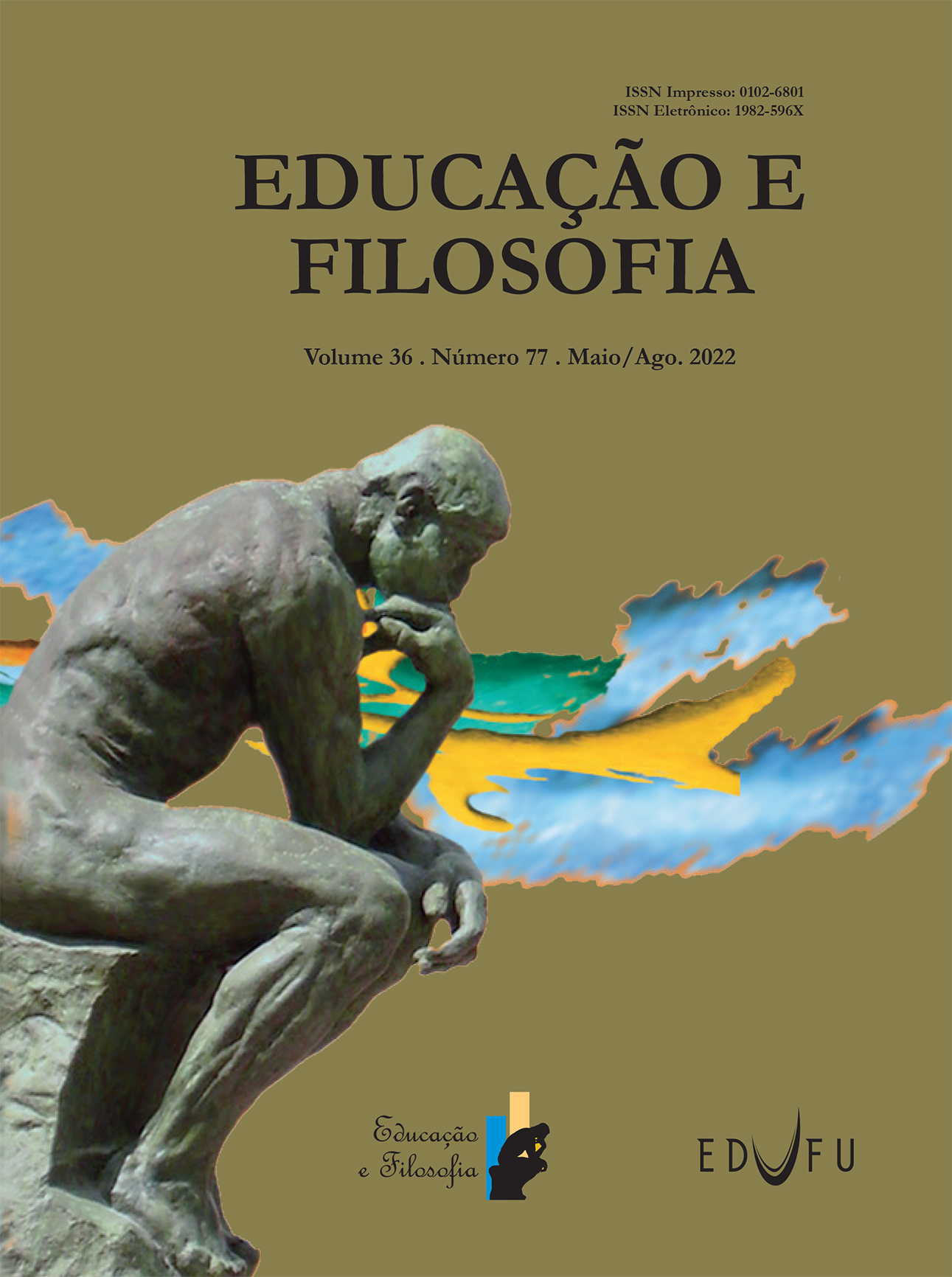Liberdade e eticidade: o diagnóstico crítico da modernidade política em Hegel
v.33 n.69 set./dez. 2019 • Educação e Filosofia
Autor: Marcos Lutz Müller
Resumo:
Após uma sucinta caracterização do processo de diferenciação e separação histórico-conceitual entre sociedade civil e Estado, respectivamente, entre o indivíduo burguês e o cidadão como traço principal da modernidade política (1), empreende-se uma análise concisa dos três registros da “apresentação” (Darstellung) do conceito de liberdade, que, no âmbito do espírito objetivo, culmina no desenvolvimento do conceito de eticidade (2). Em seguida, explicita-se os três momentos lógicos, isto é, os três elementos constitutivos e processuais do conceito de liberdade (universalidade, particularidade e singularidade) (3), que, em sua efetivação no âmbito do espírito subjetivo, assume três figuras, a da vontade natural, a da vontade do arbítrio e a da vontade livre que quer a efetivação universal da liberdade como seu “conteúdo, objeto e fim” (4). Hegel é por excelência o filósofo da modernidade política e, ao mesmo tempo, o seu crítico, na medida em que aprofunda a ruptura com a fundamentação teológica e jusnaturalista que o contratualismo moderno introduz no pensamento ético-político ao fundar a família, a sociedade e o poder político na vontade livre autônoma, ao mesmo tempo em que critica o caráter atomista e negativo da liberdade individual que o paradigma contratualista põe como sua base. (5) Por fim, examina-se mais detidamente os dois pilares fundamentais que fundam a estrutura normativa de uma eticidade moderna e reflexiva (6): a pessoa como sujeito de direitos (6A) e a liberdade subjetiva da consciência moral moderna (6B).
Abstract:
Departing from a brief characterization of the historical-conceptual process by which civil society and the state, respectively, the bourgeois and the citizen, differed and separated from one another – a fundamental trait of political modernity – (1), I have undertaken a concise analysis of the three moments of the exposition (Darstellung) of freedom’s concept, which, within the scope of objective spirit, culminates in the development of the concept of ethical life (2). Thereupon, I have elucidated the three logical moments, that is, the three constitutive and procedural elements of freedom’s concept, namely, universality, particularity and singularity (3), which, in their effectivation within the scope of subjective spirit, assume three figures: that of natural will, arbitrary will and the free will which wants the universal effectivation of freedom as its “content, object and aim” (4). Hegel is thus the philosopher of political modernity par excellence and, simultaneously, its severe critic, inasmuch as he, on the one hand, deepens the rift which modern contractualism introduced in ethical-political thought when it founded family, society and political power upon autonomous free will, and on the other, inasmuch as he, at the same time, tears down the atomist and negative character of individual freedom set forth by the contractualist paradigm as its basis. (5) Finally, I examined in detail the two fundamental columns upon which a normative structure of a modern and reflexive ethical life are based: the person as subject of rights (6.a) and the modern moral consciousness’ as subjective freedom (6.b).
ISSN: ISSN Impresso: 0102-6801 e ISSN Eletrônico: 1982-596X
DOI: https://doi.org/10.14393/REVEDFIL.v33n69a2019-56408
Texto Completo: http://www.seer.ufu.br/index.php/EducacaoFilosofia/article/view/56408
Palavras-Chave: Liberdade. Modernidade política. Diferença entre sociedade e Estado. Eticidade. Pessoa. Consciência moral.

Educação e Filosofia
A Revista Educação e Filosofia mantida pela Faculdade de Educação e pelo Instituto de Filosofia da Universidade Federal de Uberlândia e seus respectivos programas de pós-graduação tem como propósito o incentivo à investigação e ao debate acadêmico acerca da educação e da filosofia em seus diversos aspectos, prestando-se como um instrumento de divulgação do conhecimento especialmente dessas duas áreas. Está indexada em 11 repertórios nacionais e internacionais e atualmente está avaliada no Qualis da CAPES com estrato A2.
